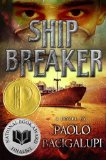by Paolo Bacigalupi
Little, Brown, and Company, New York, 2010. 326 pages.
Starred Review
2011 Printz Award Winner
2010 National Book Award Finalist
2011 Sonderbooks Stand-out: #2 Other Teen Fiction
Ship Breaker tells the story of a boy caught on the wrong side of progress in a future world after the Age of Acceleration has ended. The story is gripping, with Nailer in life-or-death danger on every page. Yet Paolo Bacigalupi builds a world that shows the consequences of society’s actions now, without ever letting the story slow down to tell us what’s going on. We learn through the eyes of the characters.
The book begins with Nailer crawling through the ducts of an old oil tanker, lit only by LED glowpaint on his forehead. He’s after the light stuff – copper wiring, steel clips, things that can be dragged out to his crew waiting outside.
The author doesn’t have to tell us they’re poor. He describes the wire being pulled out of the duct, “She sucked the wire out like a rice noodle from a bowl of Chen’s soup ration.” We begin to understand that he’s scavenging parts when we read about the new clipper ships: “Replacements for the massive coal- and oil-burning wrecks that he and his crew worked to destroy all day long: gull-white sails, carbon-fiber hulls, and faster than anything except a maglev train.”
Nailer was too slow in there, and he needs to go back in to get more scavenge before a big storm hits. He forgets to renew his LED paint, and gets caught in the dark. That’s okay, he’s finding plenty of copper wire that leads him out – until a duct collapses under him and he falls into a tank of oil.
“How could he die in such a stupid way? This wasn’t even a storage tank. Just some room full of pooled waste oil. It was a joke, really. Lucky Strike had found an oil pocket on a ship and bought his way free. Nailer had found one and it was going to kill him.
“I’m going to drown in goddamn money.
“Nailer almost laughed at the thought. No one knew exactly how much oil Lucky Strike had found and smuggled out. The man had done it slow, over time. Sneaking it out bucket by bucket until he had enough to buy out his indenture and burn off his work tattoos. But he’d had enough left over to set himself up as a labor broker selling slots into the very heavy crews that he’d escaped. Just a little oil had done so much for Lucky Strike, and Nailer was up to his neck in the damn stuff.”
Then one of his crewmates, Sloth, finds him. He begs her to bring help, to get him out, but she can’t resist the thought of pulling her own Lucky Strike. But when Nailer does find a way out, even though the oil goes out with him, Sloth is exposed as a traitor, and Nailer’s new nickname is Lucky Boy, because everyone knows he should have died.
That dramatic incident is important, because after the storm Nailer and his crewmate Pima find a wrecked clipper ship with one lone survivor. The rings on the girl’s fingers alone would be enough to set them up for life. But Nailer doesn’t have the heart to kill the girl, because he now knows what it was like to be left for dead. That incident gets him thinking throughout the book about what it means to be family, what it means to be Crew.
The tension in this book doesn’t let up for a second, and it’s life-or-death danger on almost every page. Nailer and Pima aren’t the only ones to find the girl, and the group with Nailer’s father is not at all interested in keeping her alive, only in getting money from her.
They go from one danger to another, with Nailer trying to figure out not only what’s the right thing to do, but also how to stay alive.
This book is a thriller all the way along, with a never-flagging plot. And it presents hard-hitting commentary and questions about our way of life now.
I finally read this book when taking a class on the Printz Award. It definitely seems worthy of the award it won: Besides telling a rip-roaring story, it warns us that in our policies even now, we should look out for the little guys. We should think about the consequences of the things we do.
Here are my notes on his brilliant acceptance speech at the Printz Awards.
Find this review on Sonderbooks at: www.sonderbooks.com/Teens/ship_breaker.html
Disclosure: I am an Amazon Affiliate, and will earn a small percentage if you order a book on Amazon after clicking through from my site.
Source: This review is based on a library book from the Fairfax County Public Library.
